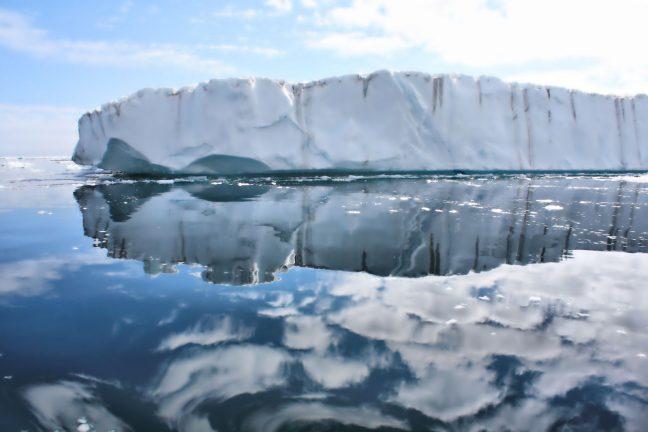Earth’s oceanic conveyor belt, responsible for transporting heat and warming continents surrounding the Northern Atlantic, may be at risk of collapse in 300 years, contrary to what current climate models predict.
A University of Wisconsin professor and alumnus are trying to fix the bias in current climate models, which assume the Atlantic Meridional Overturning Circulation — a movement of water in the Atlantic which scientists compare to a “conveyor belt” — is stable with moderate climate changes as greenhouse gases, such as CO2, increase.
Wei Liu, a UW graduate who is now a Yale postdoctoral research associate, led a study emphasizing the importance of fixing this AMOC stability bias in current models to better predict future climate change.
The AMOC brings warm water up from the equator along Western Europe toward the poles where it makes a U-turn and sinks below cold, freshwater headed south along the east coast of the Americas.
This circular motion is repeated as long as the warm, saltier water coming from the south is able to sink beneath the fresher water in the Norwegian Sea near Greenland, helping maintain the mild climate of Western Europe despite the continent’s high latitude.
A complete shutdown of this conveyor belt would have chilling consequences for regions of the North Atlantic, Liu said.
“AMOC stability is very important, not only in the past but also the future,” Liu said. “In the past we’ve had abrupt climate change which is associated with the AMOC change, and in the future [scientists] also wonder whether AMOC collapse will bring the earth into the next ice age.”
But according to current models, a complete shutdown is unlikely, even in the distant future. These models predict there would only be a 15 percent decrease in AMOC activity after several hundred years of global warming, said UW professor of atmospheric and oceanic sciences and co-author of the study Zhengyu Liu.
Since the late 20th century, Zhengyu Liu said, the Intergovernmental Panel on Climate Change, the United Nations’ climate body, has favored this “conservative” climate model.
“In IPCC, all models are supposed to be stable,” Zhengyu Liu said. “All of them show that the AMOC changes very slowly and very gradually so there is nothing very substantial happening. Most people think, ‘Ok, this may not be so dramatic.’ But what we found was that the current models are all over-stabilized.”
The over-stabilization of current models means they fail to predict a potential AMOC collapse from the increase in carbon dioxide projected over the next several decades.
To fix this bias toward over-stabilization, Wei Liu created a new model which more accurately measures AMOC stability.
When Wei Liu ran both the current, biased model and new, fixed model for several centuries in conditions containing double the amount of CO2 found currently in the atmosphere, he made an eye-opening discovery.
UW researchers use NASA satellites to find reason behind Greenland’s melting ice
Contrary to the current model, which predicted a slower AMOC with insignificant change from doubled-CO2 conditions, his model predicted a total collapse in the AMOC after 300 years.
A collapse in the AMOC could onset a 3.6 degree cooling effect over the Great Lakes region and Western Europe, Zhengyu Liu said, as well as “counteract” temperature increases induced by global warming overall.
“So, theoretically, like ‘The Day After Tomorrow,’ if you say ‘a decade’ it could happen [over a decade],” Zhengyu Liu said, explaining that a complete shutdown of the heat-transporting AMOC doesn’t happen overnight.
A southward shift in the tropical rain belt, sea-level rise along eastern North America and expansion of sea-ice across the Northern Atlantic are also possible, Zhengyu Liu said, but an ice age that destroys life as we know it is unlikely.
This doubling of CO2 in the atmosphere, however, is an “idealized” prediction given there are many other global warming scenarios that can occur over this period of time, Wei Liu said.
For example, increasing CO2, and thus global temperatures, could cause increased melting of ice sheets. Most significantly, Zhengyu Liu said, the amount of ice-sheet melt water feeding into the Northern Atlantic from Greenland could actually slow down the AMOC.
Since ice sheets are frozen freshwater, their melt water is too light to mix with the saltier ocean water. This failure to mix at this U-turn point in the AMOC process — where saltier water brought up from the south sinks underneath fresher water in the north — causes it to slow down, Zhengyu Liu said.
The Greenland ice sheets, however, started melting even before humans roamed the earth, Zhengyu Liu said, so the AMOC has the tendency to “go on and off” in a natural cycle.
By observing this fluctuation of AMOC stability in the past and further observing the AMOC’s freshwater transport in the North and South Atlantic, both researchers believe their model can help reduce AMOC stability bias in the future.
“The model becomes crucial,” Zhengyu Liu said. “But the past does provide an understanding, and we can use that understanding to say what will happen in the future for climate models.”


















